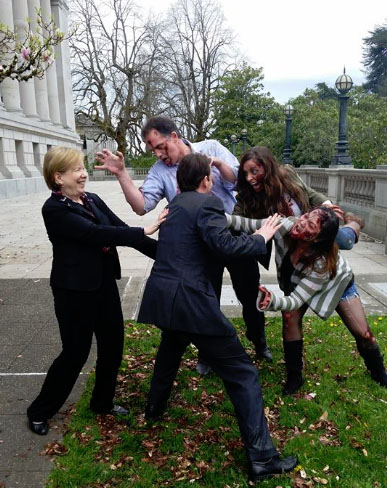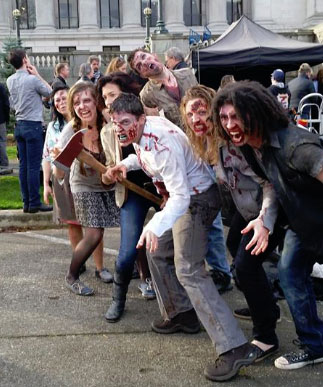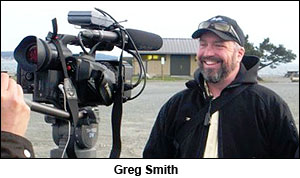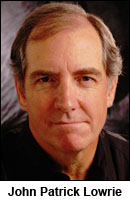STATE GOVERNMENT
Zombies attack Capitol to keep films, jobs in Washington
 OLYMPIA (March 18, 2015) — Hundreds of film and television crew members staged an apocalyptic film set, complete with zombies, Tuesday as part of an effort to educate lawmakers in Olympia about the importance of Washington Filmworks, the state’s film incentive.
OLYMPIA (March 18, 2015) — Hundreds of film and television crew members staged an apocalyptic film set, complete with zombies, Tuesday as part of an effort to educate lawmakers in Olympia about the importance of Washington Filmworks, the state’s film incentive.
Hundreds of production crew members and small business owners came to Olympia to encourage passage of SB 6027, which would phase in an increase for Washington Filmworks. Legislators had a chance to tour a staged set inspired by Z-Nation, a popular series on the SyFy network filmed in Spokane, thanks to Washington’s film incentive program. (At left, Sens. Jeanne Kohl-Welles and Andy Billig attempt to save the Legislative Building from a zombie attack. More pics here.)
“We work five days a week for six months filming in Spokane. We average 80 crew members per episode, on bigger days we have up to 120 people,” says Tony Becerra, Assistant Director for Z-Nation, who went to Olympic High School in Bremerton and attended Seattle Central’s video program. “Those are people who rent apartments in Spokane, go out to eat, buy supplies and gear, groceries, even gym memberships, and the Washington film incentive money is filtered right back into the community.”
The clear connection between Washington Filmworks and job creation and economic activity prompted delegates representing the Washington State Labor Council’s affiliated unions to approve a 2014 resolution in support of “funding Washington Filmworks at a level that increases the competitiveness of Washington state’s motion picture industry and ensures job creation and economic development opportunities across the state.”
 That’s clearly not happening today. As the The Seattle Times reports, local film and television crews are fighting to keep the film and television industry alive in Washington, which has the fifth smallest film production incentive fund out of the 39 states that have one. Every $1 the state invests in keeping film and television jobs in Washington generates more than $10 in economic boosts and jobs for our communities.
That’s clearly not happening today. As the The Seattle Times reports, local film and television crews are fighting to keep the film and television industry alive in Washington, which has the fifth smallest film production incentive fund out of the 39 states that have one. Every $1 the state invests in keeping film and television jobs in Washington generates more than $10 in economic boosts and jobs for our communities.
“With a typical big film, we’ve got a crew of 125 or more. We fill up hotels, and spend money on food in the local restaurants, grocery stores and coffee shops,” says Greg Smith, Key Grip, who recently worked on the upcoming Captain Fantastic, filmed in Washington state. “It’s a huge economic boost to a neighborhood or town’s micro-economy. Any time we travel to a distant location and stay in a hotel or eat at a restaurant, these places are glad to see us because of the money we’re spending.”
Sm ith is President of International Alliance of Theatrical Stage Employees (IATSE) Local 488, which represents more than 600 carpenters, electricians, set decorators, grips, hair and make-up artists, and other skilled workers in the Pacific Northwest.
ith is President of International Alliance of Theatrical Stage Employees (IATSE) Local 488, which represents more than 600 carpenters, electricians, set decorators, grips, hair and make-up artists, and other skilled workers in the Pacific Northwest.
“Membership is growing because of the many film and television projects in Oregon,” Smith said. “Unfortunately, many of our Washington state members have to go Portland to find work in the industry.”
Last year Washington turned away more than $55 million of economic activity and jobs. People who rely on the film industry to support their families say we cannot afford to lose more good film jobs and economic benefits to our competitors.
 Actor John Patrick Lowrie, who appears on many popular video games including HALO, is on the board of Seattle SAG-AFTRA, which represents about 1,200 actors locally. Lowrie says most of video work for actors in Seattle is on video games, commercials and industrial or corporate videos.
Actor John Patrick Lowrie, who appears on many popular video games including HALO, is on the board of Seattle SAG-AFTRA, which represents about 1,200 actors locally. Lowrie says most of video work for actors in Seattle is on video games, commercials and industrial or corporate videos.
“Television series are particularly good for our members because they have so many episodes, a bigger budget, and the crews spend more time and money in Washington’s communities,” Lowrie said. “A lot of our local members drive down to Portland to work because they have a more robust film incentive and therefore a lot more jobs.”





